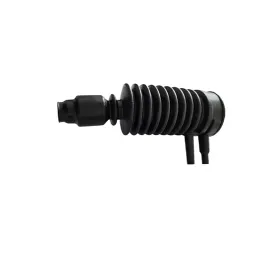Plastic Tube
1.
Material Composition and Properties
Plastic tube are typically made from high-performance polymers such as Polyvinyl Chloride (PVC), Polypropylene (PP), Polyethylene (PE), or Nylon. These materials provide the following key advantages:
- Lightweight:Plastic tube are significantly lighter than traditional metal pipes, making them easier to transport and install.
- Corrosion Resistance:They are highly resistant to chemical corrosion, ensuring their durability in harsh environments.
- Insulation Performance:Their natural insulating properties protect against electrical currents and heat transfer, making them ideal for use in electrical wiring protection and other similar applications.
- Long Lifespan:Thanks to their resistance to aging and wear, Plastic tube offer extended service lives, reducing maintenance costs over time.
2.
Extrusion Process and Customization
The manufacturing process for Plastic tube involves several critical steps:
- Material Preparation:Selected polymer pellets are fed into an extrusion machine where they are melted under controlled conditions.
- Extrusion Molding:The molten material is forced through a die to form a continuous profile, shaping it into the desired pipe structure.
- Cooling and Setting:After extrusion, the material is cooled quickly to set its shape, maintaining precise dimensions and surface quality.
- Cutting and Quality Control:Once formed, the Plastic tube are cut to specified lengths and undergo rigorous testing to ensure compliance with industry standards.
- Post-Processing Bending:To meet unique application demands, further bending processes may be applied to achieve specific angles and configurations, enhancing versatility.
3.
Applications Across Industries
Due to their versatile nature, Plastic tube find widespread use in various fields:
- Electrical Engineering:In power systems and telecommunications infrastructure, Plastic tube protect cables from external damage and environmental factors, especially when installed underground or overhead.
- Construction Industry:As drainage, heating, and ventilation pipes, Plastic tube contribute to efficient building operations while minimizing structural loads and simplifying installation procedures.
- Automotive Manufacturing:Used as fuel lines, brake lines, and air conditioning conduits, Plastic tube demonstrate superior durability and sealing performance within vehicles.
- Agricultural Irrigation:For agricultural water delivery systems, Plastic tube facilitate effective water distribution while minimizing leakage losses.
- Home Living Solutions:From plumbing connections to gas line installations and furniture accessories, Plastic tube enhance everyday convenience and safety in domestic settings.
4.
Conclusion
In summary, Plastic tube represent a highly functional piping solution that leverages advanced extrusion techniques and customization capabilities to serve diverse needs across numerous industries. Their protective qualities, light weight, and broad applicability make them indispensable components in both complex industrial projects and simple household improvements. With ongoing advancements in materials science and technology, the future outlook for Plastic tube remains promising, offering even more innovative possibilities for societal development and daily life enhancements.This detailed introduction provides insight into why Plastic tube continue to be favored by users worldwide, showcasing their reliability and adaptability in meeting modern-day challenges.








































